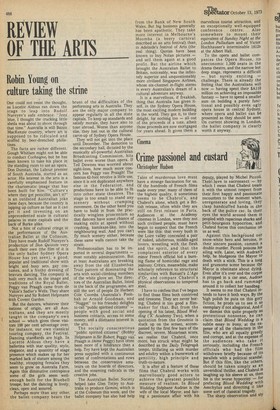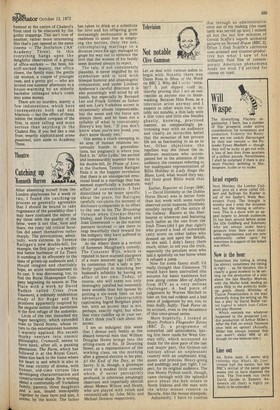Cinema
Crime passionel and custard
Christopher Hudson
Tales of murderous love must have a strange fascination for us. Of the hundreds of French films made every year, many of them of the highest quality, it sometimes seems to be Chabrol's, and Chabrol's alone, which get a British release, often while they are still on first release in Paris. Audiences at the Academy cinemas in London, were they not such civilised people, must have begun to suspect that the French were like this: that every bush in the Loire valley concealed a pair of naked, adulterous, middle-aged lovers, wrestling with the flesh and the spirit, and that the complacent exterior of every minor French official hid a burning flame of homicidal rage and jealousy. Critics, meanwhile, make scholarly reference to structural similarities with Bunuel's L'Age d'Or, and compare Chabrol's physical observations to tempered steel.
I have to confess that I've begun to find these films both contrived and tiresome. They are never boring; Chabrol is too good a filmmaker for that. But from the opening of his latest, Blood Wedding ('X' Academy Two), when a quotation from the Oresteia is stuck up on the screen, accompanied by the first few bars of the discreet, severe, Mozartean score, we realise that Chabrol, once ,more, has struck what might be described as the Daily Telegraph tempo, titillating us with murder and adultry within a framework of gentility, high principle and truth-to-nature.
It is after all a feature of these films that Chabrol works with marvellously good actors to achieve the greatest possible measure of realism. In Blood Wedding Stdphane Audran is the wife of the local Mayor, and having a passionate affair with his deputy, played by Michel Piccoli. Their love is sacrosanct — by which I mean that Chabrol treats it with the utmost respect from their first happy and passionate encounters to the moment when, unregenerate and loving, they clasp handcuffed hands in -the back of the police car. In their eyes the world around them is peopled with rapacious sharks and petit-bourgeois hypocrites, and Chabrol forces this conclusion on us as well.
Against this background our snow-white hero and heroine, in their sincere passion, commit a double murder. Piccoli poisons his ailing wife. Later, with Audran's help, he bludgeons the Mayor to death with a stick. This is a long and gruesome scene because the Mayor is obstinate about dying. Even after it's over and the corpse is propped in a car seat, Audran has to go back and rummage around it to collect her handbag.
It seems to me that Chabrol intends to have it both ways. By the 'high polish he puts on this gory fiction, he prods us to see it as exemplary if not allegorical. And if we dismiss this quite properly as pretentious nonsense, he can claim that Blood Wedding is a subtle essay in irony, at the expense of all the characters in the film, who are all equally greedy and corrupt, and at the expense of the audiences who take it seriously, including the French officials who had the film withdrawn briefly because of its parallels with a political scandal. But if this film, like the others, should be taken simply as an unveridical thriller, and Chabrol is laughing up his sleeve at us, then his is the worse hypocrisy — for prefacing Blood Wedding with Aeschylus and directing it like some sort of classical tragedy.
The sharp observation and sly
humour at the centre of Chabrol's films tend to be obscured by the gothic trappings. This isn't true of another, rather more interesting film that's just opened at the same cinema — The Invitation ('AA' Academy Three). In this everything hangs upon the delightful observation of a group of office-workers — the boss, his stiff-necked deputy, the office clown, the family man, the gentle old woman, a couple of younger ones, and a pretty girl — who are invited one summer afternoon to a house-warming by an elderly bachelor colleague who's come into some money.
There are no murders, merely a few indiscretions, which have consequences both sad and hilarious — but the effect of these, within the modest compass of the film, is more telling and more serious than anything in the Chabrol film. If you feel like a rest from wearily sophisticated crime passionel, turn aside to Academy Three.



































 Previous page
Previous page